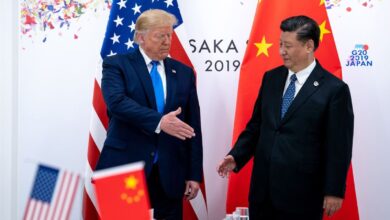French presidential election 2022: Marine Le Pen trails Emmanuel Macron ahead of run-off vote

French President Emmanuel Macron will face far-right candidate Marine Le Pen in a decisive run-off on April 24, with the winner emerging as the next president of France. If Macron wins, he will become the first sitting president to win a re-election in 20 years. On the other hand, a Le Pen victory would see Élysée Palace being home to France’s first female president.
The voting process
The French presidential election is a direct voting process conducted in two phases. In the first phase, voters whittle down a long l of prospective candidates into two. If a candidate wins over 50 per cent of the votes in the first round, he/she is elected as the president of the country. If not, as was the case in 2022, the second round of voting is held.
Any French citizen over 18 years of age is allowed to vote in the election. There are reportedly 48.7 million eligible voters this round.
In this year’s first round of voting, held on April 10, incumbent Macron clocked in the largest chunk of votes at 27.85 per cent. The second-highest percentage of votes was cast for 53-year-old Le Pen, who narrowly beat far-left candidate Jean-Luc Mélenchon to emerge as the contender for the president’s seat.
Sunday will see a repeat of the 2017 election in which Macron won with a huge margin of 66.10 per cent votes against Le Pen’s 33.90 per cent. However, the latest exit polls suggest the gap is narrower this time, with Macron predicted to net 57.5 per cent of the votes and Le Pen 42.5 per cent.
When will we know the results?
Voting begins at 8 am local time on Sunday and will go on till 7 pm. However, larger cities like Paris will have polling booths open till 8 pm.
Preliminary results are expected to trickle in at around 1.30 am on Monday. The counting continues through the night, and the final results will be out on Monday morning. The difference between the preliminary and final results are usually around 1 per cent to 2 per cent, as per local media reports.
Key issues
The key issues that have driven the conversation around the election include the rising cost of living and inflation, which has been one of the significant talking points in the run-up to the election, and which Le Pen had made the focus of her campaign. She successfully channelled the wave of discontent against Macron’s economic policies. Though Macron’s ratings initially got a boost from France’s reaction to the Russian invasion of Ukraine, Le Pen’s campaign sought to appeal to voters struggling with surging food and energy prices amid the fallout of the war. Macron’s handling of the yellow vest protests, the Covid-19 pandemic and subsequent vaccine pass too had been an important talking point.
Macron, on his part, sought to focus his campaign on Le Pen’s far-right views on immigration, her stance on the hijab, and her alleged ties to Russian banks. He said her plans to ban Muslim women in France from wearing headscarves in public would trigger “civil war” in the country that has the largest Muslim population in western Europe, as per a Reuters report.





